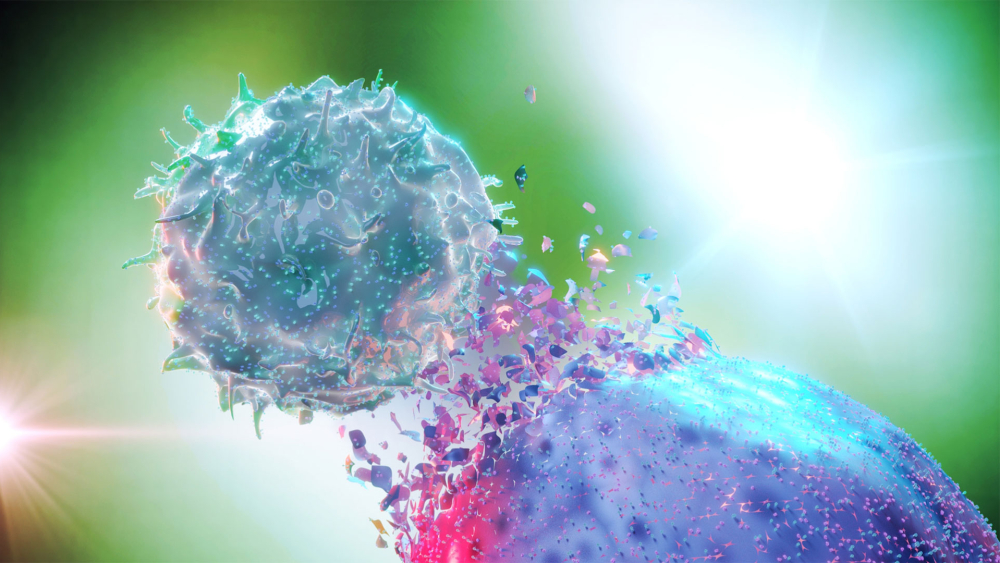August 19, 2021
CAR NK therapy - natural killer cell therapy - what is that?
With new medical therapies constantly being researched and approved, even insiders and experts might lose track of what is hot and what is not. More importantly, they might lose track of what is what in the jungle of research and new developments. In recent years, for instance, CAR-NK therapy has become a hot new topic, but what exactly are they?
NK cells is an acronym for natural killer cells, a type of immune cells that - as the name suggests - can kill target cells through similar cytotoxic mechanisms. CAR-T cells on the other hand are chimeric antigen receptor T cells that for some time now have been successfully used to destroy cancer cells. This has caused a growing interest in CAR-engineered NK cells to be applied in cancer therapy.
So while NK cells have always been a natural part of our system, scientists have found a way to modify them in order to more effectively target and kill cancerous cells present in our bodies, thus offering hope to patients suffering from blood cancer and other cancerous conditions who are unresponsive to standard chemotherapy.
Read on to find out more about the advantages and drawbacks of this new approach. We will also highlight new solutions to facilitate a reliable and safe logistical process for CAR-NK cells and other new, valuable therapies.
Advantages of the new CAR NK therapy
While scientists have been conducting research around natural killer cells for many years, CAR NK therapies are a relatively new approach. According to the ClinicalTrials database, there are currently 21 studies around CAR-NK cells either being conducted or recruiting globally, mainly in the US and China. (see all CAR-NK studies)
As opposed to CAR-T therapies, they have not yet left the phase of pre-clinical trials. However, they offer a promising new strategy and an exciting new experimental treatment option in which chimeric antigen receptors equip natural killer cells with the ability to recognize and kill target cells: As part of our immune system, natural killer cells patrol our bodies to look for and destroy abnormal cells like cancer cells or virally infected cells.
NK cells can be grown and engineered so they will target diverse antigens, enhance proliferation and persistence in vivo and to achieve an effective antitumor response by increasing infiltration into solid tumours and overcoming resistant tumour microenvironments.
Compared to CAR-T cells, natural killer cells are known to mediate anti-cancer effects without the risk of inducing GvHD, short for graft-versus-host disease. Once approved, modified CAR-NK cells could offer a number of advantages such as
- an elevated level of safety
- multiple mechanisms for activating cytotoxic activity
- high feasibility for ‘off-the-shelf’ manufacturing
History of CAR NK therapy
Adoptive Immuno cell therapy of cancer was first introduced by Steven Rosenberg and his colleagues at the National Institute of Health in the US in the late 80s. The present technology of AIET, which uses autologous natural killer (NK) cells and activated T lymphocytes to treat various cancers, was developed by Japanese scientists and is being widely practised in several Asian countries.
However, the roots of immunotherapy reach back to the 1950s, when the discovery of bone marrow transplantation allowed for living cells to be infused into blood cancer patients for the first time. This laid the foundation for developing CAR-T therapy for the control of cancer.
The groundbreaking approval of two CAR-T therapies by the FDA in 2017 (followed by further approvals by the EMA in 2018) was the climax of more than sixty years of research. There are currently several hundred clinical trials around CAR-T cells under way, the majority of which target blood cancers. Today, CAR-T therapies account for more than half of all trials for hematological malignancies.
For several years now, researchers have been working on engineering NK cells as they are known to act as the foremost innate immune effector cells against tumors with promising tumor regression rates. This knowledge has sparked rapidly evolving interest in the progress of CAR-engineered NK cells for tumor immunotherapy: Triggered NK cells can kill cancerous cells by direct cell cytotoxicity and/or generation of pro-inflammatory cytokines.
But even though NK cells can identify and eliminate tumor cells, malignant cells continue to advance their mechanisms in order to avoid identification or to limit NK cell activities. However, engineering NK cells to express a chimeric antigen receptor can defeat immune evasion. The progress of “off-the-shelf” CAR-modified NK cells is considered a promising and rapidly evolving approach in the advancement of potent anti-cancer immunotherapeutic products.
Challenges of new therapies
While immunotherapies using CAR-T cells bring hope to cancer patients who are unresponsive to standard chemotherapy, they also have their limitations and drawbacks. Clinical trials that reported cases of neurotoxicity and cytokine release syndrome (CRS) accompanied by CAR-T cell therapies have given rise to CAR incorporated into NK cells, with the vision of one day being able to offer effective treatment to all cancer patients.
As is the case with the development and approval process for any new therapy, bringing CAR-NK cells to the next level is complex and costly - and the tiniest of complications can result in major delays or losses. While research in the lab is an indisputably important ingredient of any successful medical drug, the logistical factor should not be neglected. The loss of drug substance caused by biocontamination has taken on a completely new meaning with the introduction of individual CAR-T cell therapies. In order to save as many lives as possible, the pharmaceutical industry is challenged to reduce the loss of substances to near 0%.
Remote locations and long distances add another layer to an already challenging environment: In today’s fast-paced industry with its elaborate requirements, labs that are able to grow and manipulate cells are often geographically removed, as are institutions and manufacturers that are collaborating. This calls for a functioning logistical network and sophisticated technologies to guarantee for reliable shipping of the valuable goods.
Solution for filling, freezing, transportation and draining

As more and more variants of CAR-T, including CAR-NK cell, therapies for different types of cancer are being approved, the pharmaceutical industry is facing new logistical challenges – and issues experienced during the freeze and thaw process and during the sterile filling and draining of substances will now also need to be addressed during shipping. In short, a safe logistics process as well as safe and compact solutions for single use bag protection during storage and shipping are needed.
The new therapies are highly individual, which is why they mostly require small amounts rather than substances produced in bulk. This is why Single Use Support has developed a solution that can be scaled up as well as down, allowing for the highest degree of flexibility. RoSS.KSET offers protection for drug substances between 1 ml and 250 ml so you can scale down to a single drop of drug substance.
For anything more than a drop, RoSS offers protection for one or multiple small single use bags in one shell. In the RoSS.KSET, the filled bags are covered by a layer of soft 3D foam to offer protection, dampen shocks and allow for an expansion of the liquid volume and the bag in the freezing process.
The RoSS.KSET unit is made of high-density stainless steel. The container can be locked and sealed that allows tamper-evidence. This guarantees absolute protection against manipulation as well as intuitive handling at the same time.
The content is frozen using a fast freezing process to keep the quality as high as possible, while the stainless steel surrounding the foam-covered bag is the ideal basis to keep the freezing process effective from the beginning all the way to the end. In addition, it allows for a gentle thawing process, making sure the qualities are preserved.

Conclusion
CAR engineering of T cells has revolutionized the field of cellular therapy for the treatment of cancer, and recently NK cells have emerged as safe and effective platforms for CAR engineering. While this approach is truly ingenious, it comes with certain issues owed to the nature of NK or cancer cells, and tumor immune escape mechanisms require feasible solutions. The lengthy process of trials and approval proves to be another obstacle, especially when there is an urgent need for new, effective medical drugs to cure cancer and other potentially fatal diseases.
Yet, pharmaceutical and medical scientists seem to agree that immunotherapies based on CAR-NK engineered cells are the future when it comes to promising forms of therapy to substitute or replace chemotherapy. However, while there are still plenty of challenges to be faced and issues to be solved, Single Use Support can at least provide solutions to meet the logistical challenges. Their flexible and scalable technologies offer reliable and protected freezing and thawing for storage and shipping, so you can make sure your product reaches its destination unharmed and in mint condition.


